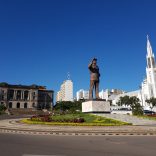Award ceremony of the 4th edition of the Writing and Handicraft Contest - Cornelder de Moçambique
Hunger is the “very silent weapon” holding back Mozambique, says Sérgio Raimundo

FILE - Sérgio Raimundo gave an interview to Lusa in the city of Praia, Cape Verde, on the sidelines of a Lusophone writers’ meeting. [File photo: UCCLA]
Mozambican writer Sérgio Raimundo argues that the greatest revolution in the world will be the end of hunger, a silent weapon that in Mozambique stifles even thought, preventing many young people from reflecting on the state of the country.
“How can someone who does not even have one meal a day be capable of reflecting on their country?” asks the author of “O colono preto saiu do guarda-fato” [The black colonist has come out of the closet] in an interview with Lusa in the city of Praia, Cape Verde, on the sidelines of a meeting of Lusophone writers.
For the journalist and author of several awarded books, hunger is “a very silent weapon”, and ending it would be the first measure he would take, if he had the possibility to change the country, which he left in 2020.
At 33 years old, and therefore born in the year of the signing of the 1992 General Peace Accords, the writer laments that in his country, especially in the northern region, there are districts where families are forced to eat grass.
“On grass! So, I think that hunger is the first thing, which then limits everything; it limits us to dream, it limits us to imagine tomorrow,” Raimundo says.
Like so many other writers he admires, Sérgio Raimundo left Mozambique in search of better conditions. “If those conditions existed in my country, I would be in my country.”
He says that he wrote in the same way as now, even while still in Mozambique, but recognises that his voice became “more projected” when he left.
“I already wrote in newspapers in Mozambique, in the same style, in that style of social engagement, denunciation, satire above all, which touches on any political, cultural subject. Internally, I think it did not have much echo, but then I moved to Portugal and it gained a dimension that even left me perplexed,” he said.
Perhaps because “I am a young person who, through his means, moved to Portugal and ended up being a kind of beacon, a source of inspiration for other young people, but also because those who are in Mozambique are afraid to write about what happens there”, he added.
“Many people think that I write that way because I am abroad, because what we witness in our countries is a kind of abortion of many things that we have in our throats,” he continues. “And when someone appears and takes those things out of their throat, we start to applaud, because it is as if that person spoke what we have, as if they spoke what torments us.”
Sérgio Raimundo published several poetry books in Mozambique and wrote the novel “A Ilha dos Mulatos”, which “many academics call ‘the bible on Cabo Delgado’, and which was written in 2019, reporting everything that is happening today in Cabo Delgado”.
The work in 2019 received the Eugénio Lisboa Literary Prize of the National Press Casa da Moeda (INCM) Mozambique, an award aimed at honouring the Mozambican writer after whom it is named.
In 2023, the writer published “As ancas do camarada chefe”, a set of chronicles on Mozambican social problems that mainly affect young people, and the book’s title earned him some threats in Mozambique, especially due to the use of the term “camarada chefe” to identify the leadership of Frelimo, the ruling party.
Sérgio Raimundo’s words were also used as slogans during youth protests that followed the 2023 death of rapper Azagaia, a social intervention singer.
“It is difficult to be abroad, because when we are abroad we can better visualise our country,” which “is a very complex country, but it is a country that has everything to succeed. I write driven by this hope of believing that one day things will still take a completely different path.”
Until then, he laments the distance and the loss of friends during the struggle for a better Mozambique.
“Much of the youth of Mozambique, especially those born in the 1990s, lost a friend, a neighbour, mainly active youth – youths who are activists – during the recent demonstrations. I have activist friends who were shot – have activist friends who to this day bear the scars of those demonstrations,” he said.
Earlier this year, when Mozambique celebrated 50 years of independence, Sérgio Raimundo published another collection of chronicles, entitled “O colono preto saiu do guarda-fato”.
“We live a kind of colonial dawn. That is, we still have colonial traces: we have a kind of colonial apparatus in which the conductor, or the person who directed the apparatus, was the settler and has gone. What is there now is ours, but it continues to be run in the same way as the settler directed that apparatus,” he observed.
“The colonial apparatus is there. It is a wound, but for that wound to heal really needs everyone’s contribution,” he concludes. “As a country, we need this handshake, and to dream the country.”
Sérgio Raimundo represented Mozambique at the XIII Meeting of Portuguese Language Writers, which took place in the Cape Verdean capital from Thursday to Saturday last week, an event organised by the Union of Capitals of the Portuguese Language (UCCLA) and the Municipal Chamber of Praia.
Lusa travelled to Cape Verde at the invitation of UCCLA.












Leave a Reply
Be the First to Comment!
You must be logged in to post a comment.
You must be logged in to post a comment.